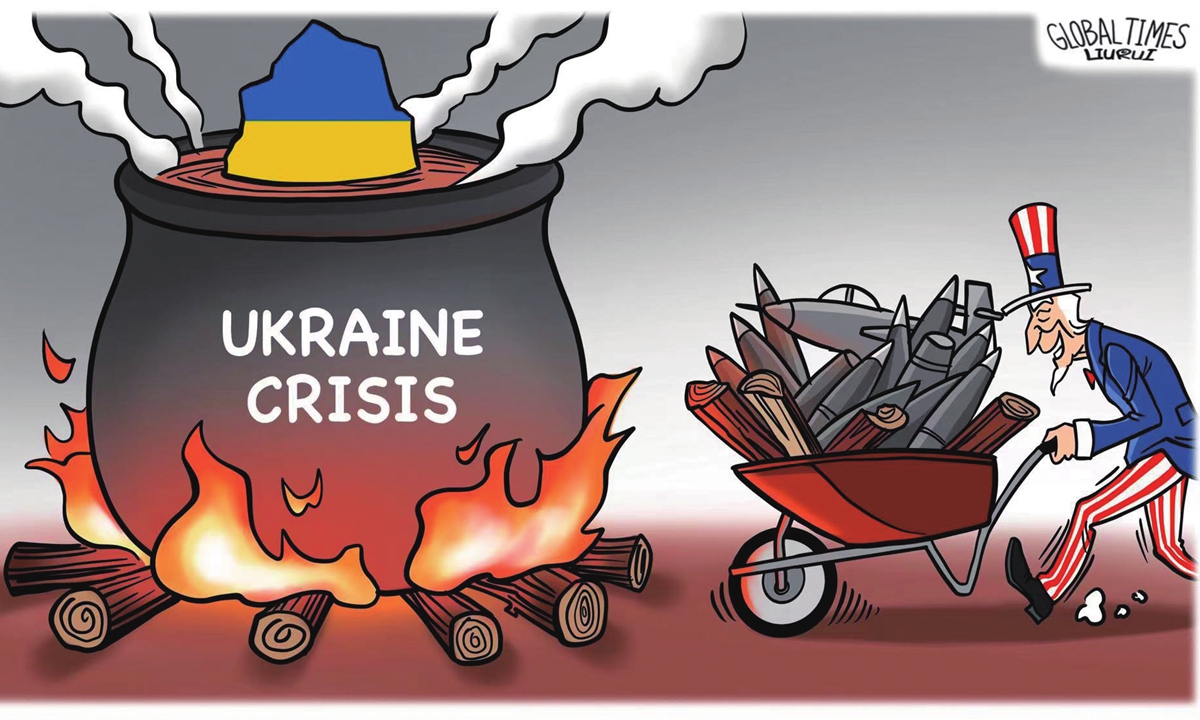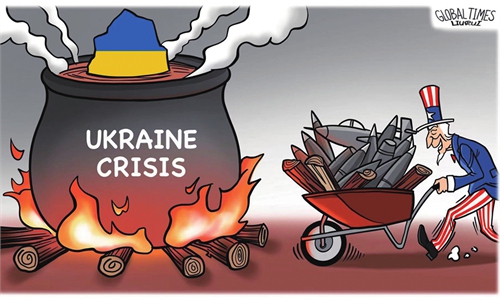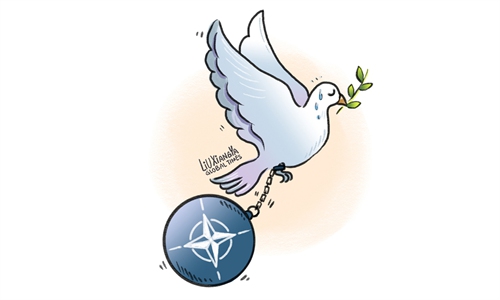A lesson from Russia-Ukraine conflict: not to go along with US provocations to create crisis

Illustration: Liu Rui/GT
Editor's Note:At the two ends of Eurasia, the US has been provoking Russia through Ukraine and provoking China through the island of Taiwan. What lessons can the world draw from the Russia-Ukraine conflict? Does the US want to provoke a war in the Taiwan Straits to contain China? Sara Flounders (Flounders), a political writer and activist for 50 years in the US, shared her thoughts in an interview with Global Times (GT) reporter Wang Wenwen. Flounders is a contributing editor of Workers World Newspaper and helps coordinate the International Action Center and the United National Antiwar Coalition.
GT: The Russia-Ukraine conflict has dragged on for more than a year. What lessons can the world draw from this conflict?
Flounders: Hopefully, they will draw the conclusion not to go along with US provocations, intentional disruptions, and efforts to create crisis.
Now, out of this war in the past year, Russia has not only survived economically, its currency and its trade with the Global South have been reinforced and are stronger today. However, for the EU, they're in a much weaker position. We shouldn't forget that even though they are US allies, they are also competitors. The euro is now weaker than the dollar, the war has benefited the US and yet has been very harmful for all of the EU countries that went along with the war.
I think countries around the world will draw their conclusions. Do they want to be roped into this? Especially in Asia, who can US imperialism rope in in terms of their own sovereignty? Who can resist the US pressure?
GT: Taiwan regional leader Tsai Ing-wen was in California and met US House Speaker Kevin McCarthy. While the US contains Russia through the Ukraine war in Europe, does it also want to provoke a war in the Taiwan Strait to contain China?
Flounders: This meeting was a direct and intentional violation of signed agreements that the US has made with China. China is one. Taiwan is a province of China. This is agreed to by the world, by the United Nations, by the US and by Taiwan's "constitution." For Kevin McCarthy to line up other congressional members and meet with Tsai Ing-wen is a direct violation of past agreements.
In the same way that Nancy Pelosi's trip to Taiwan last year was a direct and deliberate violation of the agreement. There's no reason to do this, except to attempt to create provocations, to create further disruption of what had been an orderly process of reconciliation and of Taiwan becoming part of China, which is the wish for great majority of the people, even in Taiwan.
China's approach is to continue to use diplomacy to not be baited into an intentional provocation. However, it is becoming a difficult situation because one offense after another, one arms shipment after another. And US aircraft carriers, nuclear submarines, destroyers, sail into the Taiwan Straits. These are all intended provocations, and any one of them could be a dangerous jumping-off point.

Sara Flounders. Photo: Screenshot
GT: The US pursues hegemony by provoking conflicts. China promotes a human community with a shared future. What do the two differing governance concepts bring to the world?
Flounders: The very concept of shared future and cooperation has a profound impact. It's not threatening to other countries, and it has the win-win idea, meaning if your economy is growing and our economy is growing, that's better for both of us. That's the basis of building further and deeper trust.
The US way of operating, from its very founding, has been ruthless competition. The US is built on the African slave trade, the genocide of indigenous people, the exploitation of workers and constant expansion. It must, as an economic system and thoroughly capitalist system, expand or die. That is how they see it.
Corporate CEOs see now they're not expanding. That to them is death and dangerous because they can more easily literally envision the end of the world than the end of their own power, and they will risk a great deal. These are very ruthless people.
The US and China have two systems. In China, the Communist Party of China is operating in the interests of the working people of China. It's why China was able to solve its own problems and develop its economy.
The political parties in the US operate on the interests of the top corporations and banks. And the top corporations are military industries who pay the lobbyists and run the politicians. That's where the loyalty is. You can't even have anti-war politicians. They're elected into office and they will vote again and again for the military budget and go along with the wars, even if they've promised that they wouldn't when they were running.
GT: What role does Global South play in rejecting US imperialism? What does this trend mean for the changing global geopolitics?
Flounders: It's really quite incredible to see the refusal of all the countries of the Global South to go along with US sanctions on Russia and they more actively sought to pursue trade in many different forms. It's even clearer today. You can see it with the BRICS. You can see it with the agreement of Saudi Arabia and Iran. Us policy has always been to set countries, particularly these two countries in the Middle East, against each other. And instead, they found this is a danger to both of them. They try to normalize relations and not go along.
Dedollarization has become a fact. That's a huge change, because the US dollar has been the basis of all trade for decades. These changes are coming so quickly and it's hard to even put them all together. In the past to meet the demands of the IMF or the World Bank, it was a surrender of sovereignty for many countries. You have to prove what industries you would lay at the feet of the US, what would be privatized, what you're turning over to them. Entirely different agreements are being reached now.
So I think the term is being increasingly used by so many - the emergence of a multipolar world. That is a reality. Will the world operate in the interests of a tiny handful of multibillionaires? Or will there be new forms of trade, exchange, and development that benefit the world and its billions of people? That is respectful of the many differences that do still exist.
US hegemony is declining. It's a very dangerous juncture, because this is very threatening to US imperialism and we have to be prepared what they will do to try to preserve their role. Our interests are one with people in the world for peace, for development, for reconciliation, and not for corporate profit.


